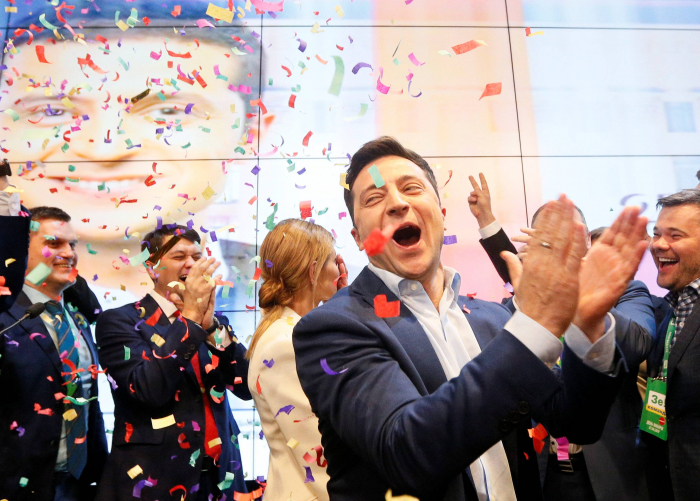On Sunday night, Volodymyr Zelenskiy jumped up and down on stage as exit poll results flashed on a giant screen behind him. He now knew he would be Ukraine’s next president. Zelenskiy kissed his wife, high-fived his team, and turned around to send his first message via hundreds of reporters and TV cameras that crammed his election headquarters. It was meant for the post-Soviet countries: “Look at us, anything is possible.”
Zelenskiy’s own story is proof of that, and nothing short of extraordinary. A year ago he was a comic, a character from a TV series, portraying a simple man who becomes president by chance after a video recording of his rant about corruption goes viral. On Sunday, the hologram became reality, as Zelenskiy’s victory smashed national political records.
With almost all votes counted, Zelenskiy, 41, received an unprecedented 73%of the national vote. His rival, incumbent Petro Poroshenko, received just 25%. Zelenskiy – who continued to film his TV series and tour the country as the frontman of his comedy show during the election campaign – became the first president since independence in 1991 to be backed by the majority of voters in all but one region of Ukraine. He is also the first with zero political experience: indeed, one would be hard-pressed to list any of his policies.
And yet Ukraine picked him out of 39 contenders who originally ran for the job (the number of candidates is also a record).
“Could I ever imagine that I, a simple guy from Kryvyi Rih, would be fighting for the presidency against a person who we confidently and definitively elected president of Ukraine in 2014?” Zelenskiy asked during his debate with Poroshenko two days ahead of the run-off vote. Zelenskiy was the only candidate who was instantly recognisable in any household that has a TV, but he was not of the existing political class and therefore was seen as a fresh face.
In 2014, Poroshenko also rode the wave of this longing for change. The revolution of dignity had just ended, forcing his predecessor, a corrupt president, to flee. It was followed by the conflict with Russia, which resulted in the annexation of Crimea and a war in Ukraine’s east.
Poroshenko promised “new life” in that election – but failed to deliver. Five years on, the war continues to bleed the nation, and so does the rule of old political elites, which is a major cause of Ukraine’s corruption.
The new president is expected to tackle that. A poll by the Kyiv International Institute of Sociology showed that 39% of Ukrainians believe he will reduce the cost of utility bills; 36% want him to strip immunity from prosecution from MPs, judges and the president himself; and a further 32% want him to start or speed up the investigation of major corruption cases.
Zelenskiy will fail in at least one of these expectations. There is next to nothing the president can do about the cost of utilities – not just because it’s a painful reflection of the state of the economy, but because such decisions are beyond his powers. It’s much easier to introduce bills that would strip immunity from prosecution. Indeed, Zelenskiy promised during the campaign that it would be among his first submissions to parliament, along with a bill on the impeachment of presidents. Zelenskiy’s team (who dubbed themselves ZeTeam) have said such bills are “almost written”. Historically, however, parliament has blocked similar initiatives because immunity has great value for corrupt MPs and judges.
ZeTeam has floated the idea of dismissing parliament if it fails to cooperate, but stressed it would prefer “plan A”, constructive cooperation.
But the real test for Zelenskiy will come when it’s time to take decisions on corruption. The president has strong powers in this domain, including appointing the general prosecutor. Yet despite pressure from civil society, Zelenskiy failed to name his candidates for this and other key jobs. “Neither [Zelenskiy], nor ZeTeam have given out any offices … and I think it’s the right, new approach in Ukrainian politics,” his campaign adviser, Dmytro Razumkov, said on election night.
And now the new president will inevitably face questions over his relationship with Igor Kolomoisky, one of Ukraine’s top oligarchs, worth $1.2bn (£900m), who is currently living in Israel. He also happens to be the man who played a significant role in Zelenskiy’s victory.
Kolomoisky and Zelenskiy are business partners in TV production companies. Moreover, Kolomoisky’s main TV channel, 1+1, generously devoted airtime to shows and news featuring Zelenskiy before and during his campaign. Kolomoisky endorsed Zelenskiy in a recent BBC interview; his bodyguard was spotted alongside the candidate on the campaign trail, and his lawyer continues to be a key adviser to the new president.
Apart from media, Kolomoisky owns multiple assets in Ukraine, including in oil and gas, ferrous metals and chemicals, agriculture and air transport. His failing PrivatBank was nationalised in 2016, costing the taxpayer about £4.7bn to rescue. And now Kolomoisky hopes for a “compensation” for the loss of PrivatBank.
How the new president will treat his oligarch friend will be the real indication of what happens to the nation in the next five years. “He is not my master,” Zelenskiy said in a recent interview. He will have to prove it now.
Katya Gorchinskaya is a journalist in Ukraine.
Read the original article on the Guardian.
More about: Ukraine
















































